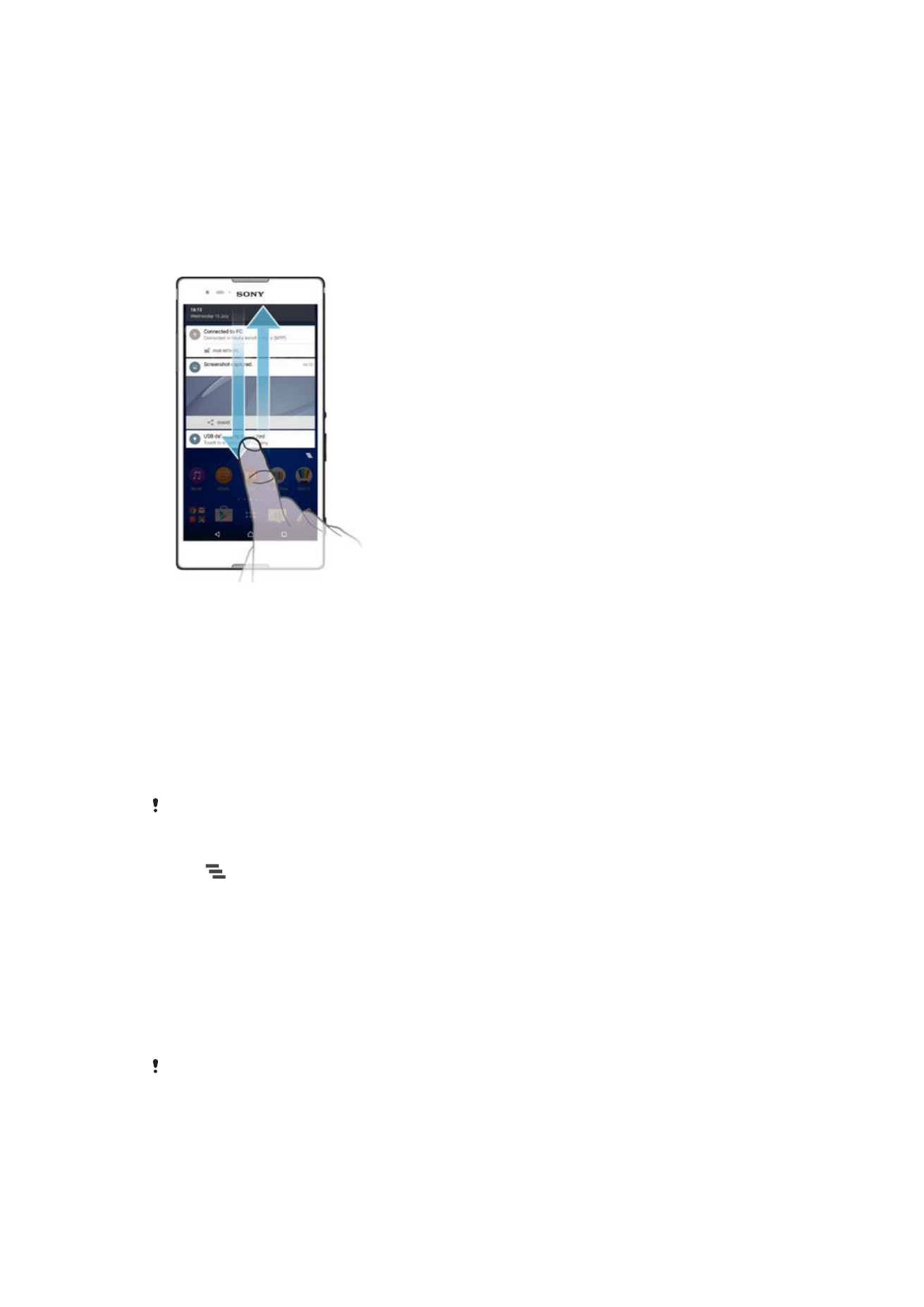
Notifications
Notifications inform you of events such as new messages and calendar notifications as
well as activities in progress, such as file downloads. Notifications appear in the following
places:
•
The status bar
•
The Notification panel
•
The lockscreen
To open or close the Notification panel
1
To open the Notification panel, drag the status bar downward.
2
To close the Notification panel, drag the panel upward.
To Take Action on a Notification in the Notification Panel
•
Tap the notification.
To dismiss a notification from the Notification panel
•
Place your finger on a notification and flick left or right.
To Expand a Notification on the Notification Panel
•
Drag the notification downward.
Not all notifications are expandable.
To Clear all Notifications from the Notification PanelS
•
Tap
.
To Take Action on a Notification from the Lockscreen
•
Double-tap the notification.
To dismiss a notification from the lockscreen
•
Place your finger on the notification and flick left or right.
To Expand a Notification on the Lockscreen
•
Drag the notification downward.
Not all notifications are expandable.
Managing Notifications on the Lockscreen
You can set up your device so that only selected notifications get displayed on your
lockscreen. You can make all notifications and their content accessible, hide sensitive
23
This is an Internet version of this publication. © Print only for private use.

content for all notifications or specific apps, or choose not to show any notifications at
all.
To Select the Notifications to Display on the Lockscreen
1
From your Homescreen, tap .
2
Find and tap
Settings > Sound & notification > When device is locked.
3
Select an option.
Notification Display Options on the Lockscreen
Show all notification
content
Get all notifications on the lockscreen. When you have this setting turned on, keep in
mind that all content (including the content of incoming emails and chats) will be
visible on your lockscreen unless you designate the relevant apps as
Sensitive in the
App notifications settings menu.
Hide sensitive
notification content
You must have a PIN, password, or pattern set up as your screen lock in order for
this setting to be available.
Contents hidden is displayed on the lockscreen when
sensitive notifications arrive. For example, you'll get a notification for an incoming
email or chat, but the content won't be visible on your lockscreen.
Don't show
notifications at all
You won't get any notifications on the lockscreen.
Setting the Notification Level for an App
You can set different notification behaviors for individual applications. For example, you
can block all email notifications, prioritize Facebook™ notifications, and make the
content of messaging notifications invisible on the lockscreen.
To Set the Notification Level for an App
1
From your Homescreen, tap .
2
Find and tap
Settings > Sound & notification > App notifications.
3
Select the app you want to change the notification settings for.
4
Drag the relevant slider to the right.
Notification levels and options for specific applications
Block
Never show notifications for the selected app.
Priority
Priority level notifications appear on the lockscreen above all other notifications.
Sensitive This option is only available if you set up a PIN, password, or pattern as your screen lock and
selected
Show all notification content under the When device is locked setting. Notifications for
the app appear on your lockscreen but their content isn't visible.
Notification Light
The notification light informs you about battery status and some other events. For
example, a flashing white light means there is a new message or a missed call. The
notification light is enabled by default but can be disabled manually.
When the notification light is disabled, it only lights up when there is a battery status warning,
such as when the battery level falls below 15 percent.
To Enable the Notification Light
1
From your Homescreen, tap .
2
Find and tap
Settings > Sound & notification.
3
Drag the slider beside
Notification light to the right.
24
This is an Internet version of this publication. © Print only for private use.